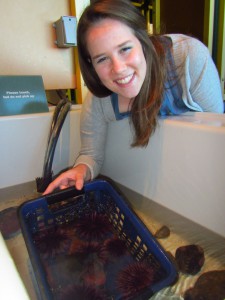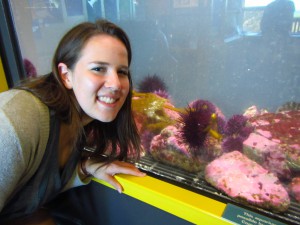Emily Schumacher, San Diego State University
Project: Determining Sea Urchin Response to Variable Climate Conditions Through Genome Analysis
Advisor: Grant Pogson
Climate change is projected to vastly change ocean temperature and chemistry, forcing marine species to live under conditions they have otherwise not experienced before. Understanding how marine species can adapt to such warming conditions is essential because their habitats on average will climb in temperature and change in chemical composition. As a group, sea urchins are well adapted to living under variable conditions among populations of a species and between closely related species. Strongylocentrotus intermedius shares a common ancestor with two deep, cold-water urchins, but presently resides in shallow intertidal and subtidal water making it an excellent organism to study the adaptations that allow species to thrive in warm waters. By using maximum likelihood branch sites and sites tests, I analyzed the a dataset containing 6,520 genes to determine which loci are positively selected and their functions. Trans-membrane transport proteins were positively selected for by both the sites and branch sites test. I observed that trans-membrane transport proteins showed strong positive selection by both the sites and branch sites tests. More tests are still needed, but my results suggest that adaptation to variable climates are facilitated by trans-membrane transport proteins and signaling molecules. The importance of temperature as a selective agent, however, is still unclear.


